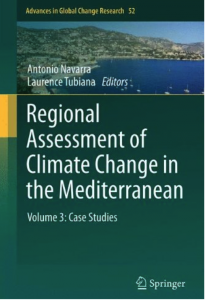
Volume 3: Case Studies
Editors: Antonio Navarra, Laurence Tubiana
ISBN: 978-94-007-5768-4 (Print) 978-94-007-5769-1 (Online)
Series Title: Advances in Global Change Research
Series Volume: 52
Series ISSN: 1574-0919
DOI: 10.1007/978-94-007-5769-1
Publisher: Springer Netherlands
Volume 3 presents case studies performed in CIRCE, representing urban, rural and coastal environments and drawn from the north and the south of the Mediterranean shore.
Chapter 6: Goodess, C.M.; Agnew, M.D.; Hemming, D.; Giannakopoulos, C.; Bindi, M.; […]; Lionello, P […]; (2013) Synthesis and the Assessment of Adaptation Measures, (A.Navarra and L.Tubiana eds), Regional Assessment of Climate Change in the Mediterranean, in Advances in Global Change Research 52, 163-201, Springer Netherlands, ISBN: 978-94-007-5768-4 (Print) 978-94-007-5769-1 (Online)
Abstract
The final stage of the CIRCE case-studies integrated assessment involved identification and evaluation of the effectiveness of local and regional adaptation options in collaboration with stakeholders, and in the context of wider national adaptation policies and strategies. This stage provides a synthesis of both the case-study work and the wider CIRCE project since it draws on the case-study indicators for present and future periods together with wider CIRCE work on adaptation options, particularly in the thematic areas of agriculture, forestry and ecosystems, and Mediterranean communities. This synthesis and evaluation links impacts and vulnerability with adaptation, and also benefits strongly from the local stakeholder workshops held towards the end of the project. Lessons learnt and key messages from the CIRCE case studies are presented. While the objectives of the CIRCE case studies have generally been achieved, a number of research gaps and needs remain.